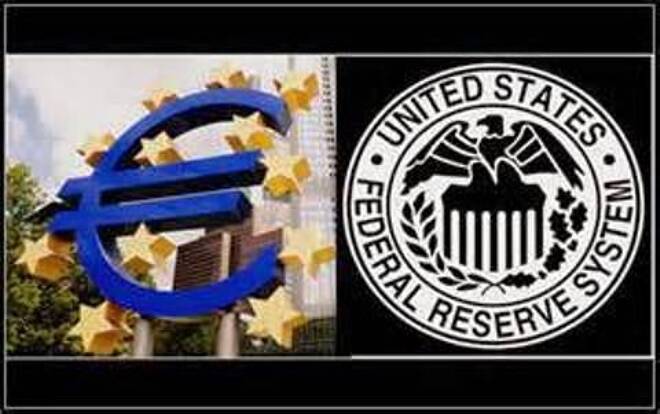Advertisement
Advertisement
Fed & ECB Action Almost Locked Down
By:
On Wednesday as US traders prepared for the long holiday the dollar slightly gained ground against the yen as U.S. jobless claims report for last week
The euro fell against most major currencies on Wednesday on expectations of further European Central Bank monetary stimulus, while US economic data was strong enough to lift the dollar. Expectations are rising that the ECB will take action next week, with news accounts pointing to a chance of the central bank increasing its debt purchases or surprising the market with unconventional measures. The drop in the euro tracked a fall in German government yield bonds after news reports that the European Central Bank was considering further measures to shore up the eurozone economy. Reuters reported that European Central Bank policy makers have considered adding purchases of regional bonds and even re-bundled loans with a risk of nonpayment.
Yesterday’s economic data came in mostly in line or above expectations, suggesting the Federal Reserve is likely to raise interest rates in its next meeting in December. Speculators noted that the appreciation of the dollar so far has already priced in a rate increase in December, and that further appreciation is unlikely if the Fed takes a slow approach to subsequent rate increases. The weekly jobless claims fell to 260,000 last week, near the lowest level in years. Consumer spending rose slowly in October for the second straight month, as Americans boosted savings and spent less on new cars and trucks. Meanwhile, U.S. orders for long-lasting or durable goods rebounded in October to show the first increase in three months. New home sales rebounded in October, but the underlying trend continues to move sideways.
There was little data of major consequence in the Asian session this morning and trading is expected to be muted with US traders on holiday. The New Zealand trade balance recorded a trade deficit of almost $1bn in October, close to market expectations. The trade balance is typically at its lowest around this time of year; in seasonally adjusted terms, the deficit widened slightly to $445m. Exports were little changed from September. The kiwi gained 5 points to 0.6584 while the Aussie declined 23 points after data showed a significant drop in capital expenditures as worries over the Chinese economy persists and lower ore prices weigh on the economy. The Aussie is trading at 0.7228.
The Japanese yen gained but remained dead center of its trading ranges. Against the US dollar the yen traded at 122.63 and against the weak euro the Asian currency exchanged at 130.19.
About the Author
Barry Normanauthor
Advertisement
